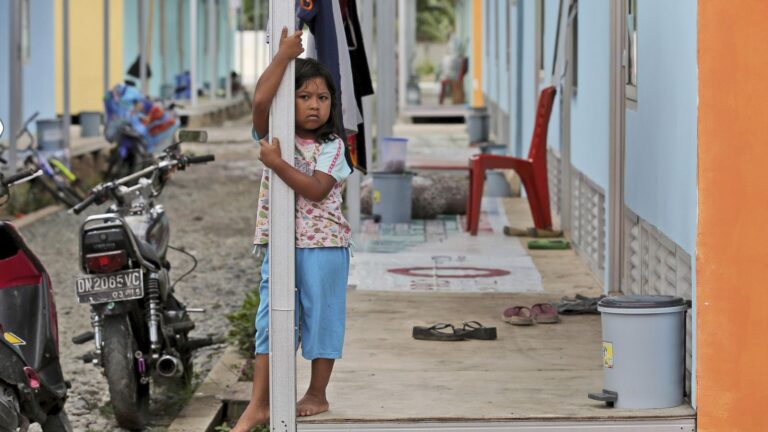Indonesia’s government under outgoing President Joko Widodo is expanding the public housing savings scheme known as Tapera, ostensibly to ease the country’s worsening housing crisis. The scheme is already in place for civil servants, but by 2027 it will be mandatory for nearly all workers to participate.
Under the Tapera scheme, workers would be required to contribute 2.5 percent of their salary which would be automatically deducted, while employers would only have to pay an additional 0.5 percent. Self-employed workers would also be required to participate, paying the full 3 percent. Workers would then be able to use the fund as financial assistance in the form of reduced interest rates on loans when buying or renovating a home.
In other words, money from the working class is being pumped into government coffers and bank expansion in exchange for limited financial support. Workers are supposed to receive a lump sum upon retirement at age 58, but there is no guarantee this will happen amid growing international financial uncertainty.
Indonesia, the world’s fourth largest country with a population of 280 million, is experiencing a serious housing shortage. About 26 million homes in the country do not meet residential standards, leaving about 10 million homes that need to be built. The Indonesian government needs to build about 800,000 homes per year to meet the needs of its people. However, only 229,000 homes were built with public funding in 2023, and that number is expected to fall further this year to below 200,000.
The Widodo administration argues that the housing shortage is due to financial difficulties and that expanding Tapera will help raise funds from more workers and make the shortage less severe.
But the vast wealth of Indonesia’s elite is more than enough to fund the public housing the country needs. Last year, Indonesia’s 10 biggest companies and banks made a combined $28 billion in profits, or about 463 trillion rupiah. By comparison, the amount pumped into housing subsidies in 2024 is projected to be about 9 trillion rupiah ($550 million), roughly one-fiftieth of those huge profits. While the government forces the working class to pay to solve the housing crisis, the wealth of the financial elite is only growing.
Indonesian workers, like their counterparts around the world, are finding the rising cost of living unbearable. Minimum wages in Indonesia vary from about 2 million rupiah (US$123) to a maximum of 5 million rupiah (US$306), depending on the province. The average wage also falls within this range, at about 3 million rupiah (US$183). The Tapera plan will drastically reduce workers’ real wages.
Housing is also expensive: in the capital, Jakarta, monthly rent for a studio apartment ranges from 3 million to 9 million rupiah. In urban areas, the average household’s monthly living expenses are 10 million to 15 million rupiah (US$611 to US$917).
Workers, especially young people, are also struggling to find work. Indonesia’s official unemployment rate was 5.3% in 2023, totaling 7.9 million people. The country’s actual unemployment rate is undoubtedly higher, as this figure does not include people in precarious jobs, underemployed or “not actively looking for work.” The unemployment rate for young people aged 15 to 24 was 19.4% last year.
Now Indonesia’s elite are demanding that Tapera be used to squeeze even more money out of workers who are facing tough economic times and struggling to find and keep jobs. Despite claims to the contrary, the real reason the government is implementing the measure is because the fund will increase state revenue.
Finance Ministry official Saiful Islam said the Tapera fund would not be included in the state budget and would only be used directly to subsidise housing prices and interest rates. But the Jakarta-based Centre for Economic and Legal Studies cast doubt on this claim, saying Tapera would “not only be used as a housing fund but also for government programmes for the new capital”. [being built in Nusantara] We plan to participate in the free lunch program in the future.”
Given this situation, workers were outraged by the announcement of Tapera expansion. On June 6, thousands of workers protested in front of the Presidential Palace in Jakarta, denounced the government’s policy. Elsa Yulianti, a 30-year-old freelance worker, criticized the lack of clarity of the program. “At a time when income is unstable and workers don’t know when they will be fired, the Tapera mandate will reduce our income. I earn around AUD500 (USD334) a month and land prices in Jakarta are very high.”
Elbia Shawki, a civil servant for nearly 30 years and already a member of Tapera, said at the protest that she did not realise money was being deducted from her salary, and when she checked her funds she only had 4.5 million rupiah (US$275), not even enough to buy a dollhouse. “This issue is about visibility, transparency and the fact that we were stolen from. Civil servants have suffered enough… I think this is just a ploy to see how they can raise money cheaply on a large scale,” she said.
The bottom line is that the Indonesian government and the wealthy capitalist class it represents are not concerned about the plight of Indonesia’s working class and their inability to afford housing. The expansion of the Tapera Fund is not a “half-baked” attempt to ameliorate Indonesia’s cost of living crisis. Public housing is simply being used as an excuse for the Widodo government and the bourgeoisie to extract more money from the working class.
of World Socialist Website is the voice of the working class and a leader in the international socialist movement. We depend entirely on the support of our readers. Please donate today.


